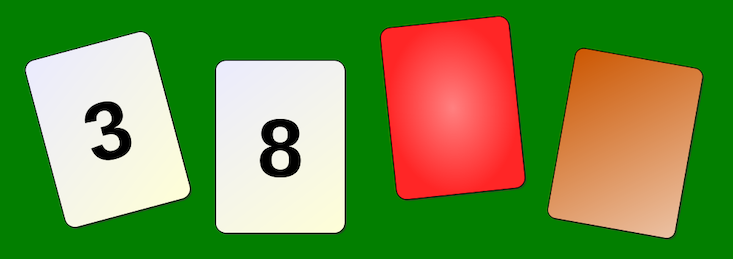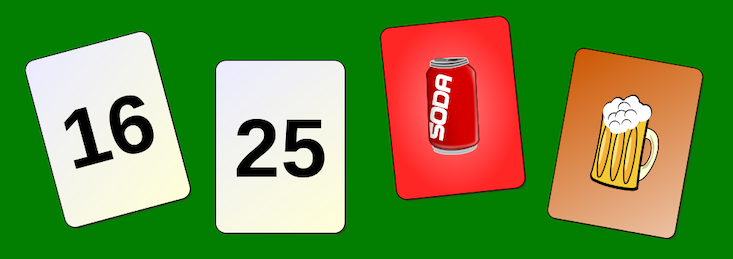In March, I was in Paris for the International Convention of Psychological Science, one of the most prestigious gatherings in cognitive science. I listened to talks from my field, human reasoning, but I also enjoyed those on ethology, because I find studies on non-human animals, from turtles to parrots, fascinating. Despite their typically small sample sizes, I found the scientific reasoning in the animal-studies talks sounder, and their explanations richer, than the work I heard on human reasoning.
The reason is simple: Ethologists evaluate their experimental paradigm, or set-up, in light of its ecological validity, or how well it matches natural surroundings. An animal’s true habitat, and its evolutionary history, have always centered the discussion. In contrast, most experimental paradigms in human reasoning, such as the Cognitive Reflexion Test (CRT) or syllogisms, are based on logic or mathematics. One of the most famous tasks of the CRT is the bat and ball problem: A bat and a ball cost $1.10. The bat costs $1 more than the ball. How much does the ball cost? Most participants fail at this task. The correct answer is not 10 cents, but 5 cents. Perhaps the ultimate tool psychologists use to study reasoning is the syllogism: For example, “Major premise: All men are animals. Minor premise: Some animals are aggressive. Conclusion: Some men are aggressive.” (Does this conclusion follow?)
As I listened to talks relying on these methods, I wondered: Do people think like that in everyday life? Probably not. Did our Pleistocene ancestors? Very unlikely. Then, how should I interpret these results? Is using abstract logic on humans like asking a turtle to climb stairs?
Nikolaas Tinbergen, the founder of behavioral ecology, famously stated that ethology is the art of interviewing animals in their own language. This principle is simple but powerful. And there is no reason why it should not be applied to humans. Psychologists studying reasoning extensively rely on logic and philosophy, and neglect psychology’s more natural ally: biology. The neglect stems in part from the ease with which humans can seem to understand one another. Our psychology is equipped with specialized cognitive systems, like theory of mind, that help us negotiate social life. We spontaneously attribute intentions, reasons, and beliefs to others. These heuristics help us to predict behavior, but they also parasitize our scientific understanding of the mind, blinding us to the necessity of using biology when studying ourselves. With turtles, there’s no problem, because we have only weak intuitions about their behaviors, and it’s difficult to ask them what they think.
Humans are, in other words, too familiar with one another. Fundamental laws of biology, like evolution by natural selection, are falsely believed to have weak constraints on human psychology—particularly for high-level cognitive functions, like reasoning. But the human brain, just like the turtle brain, has been shaped by millions of years of evolution. Reason is unlikely to have escaped its influence. What does it mean, then, to interview humans in their own language?
In a more ecological setting, when we can argue and reason collectively, the right answer spreads like wildfire.
Let’s take a concrete example. One of the most discussed tasks in the psychology of reasoning is the Wason selection task, named after English psychologist Peter Wason: “Each card has a number on one side, and a patch of color on the other. Which card or cards must be turned over to test the idea that if a card shows an even number on one face, then its opposite face is red?”

Most of us will turn 8 and the red card (even though this one is useless), neglecting the orange card that could falsify the rule (if, on its opposite face, we found an even number). Humans are very bad at this task. But what happens when we use ecological stimuli? Psychologists Leda Cosmides and John Tooby created a social version of the Wason selection task: “Each card has an age on one side, and a drink on the other. Which card(s) must be turned over to test the idea that if you are drinking alcohol then you must be over 18?”

If you are like most participants, it now seems obvious that you need to flip the beer and the 16 cards. You solved the problem effortlessly even though the task is, logically, the same as before. Our big brains likely evolved to solve tasks related to social interactions, not abstract logical problems. The Cosmides-Tooby selection task was ecologically valid; the first one wasn’t. Using the wrong experimental design, whether it’s the task itself or the stimuli, exposes researchers to many problems—the main one being that the results become hard to interpret. You don’t know if what you found reveals an interesting feature of the human mind—such as that human deductive reasoning is biased in the classical Wason selection task—or if it’s just a methodological artifact because the stimuli were not ecological.
This is why it is important, when analyzing a biological mechanism, to consider an animal’s evolutionary history—the environment in which its ancestors evolved, and the recurrent problems they had to solve. Four broad questions can be answered: “How does it work?”; “How does it develop?”; “Why does it work like that?”; and “How did it develop in the course of evolution?” The first two questions offer proximate explanations, whereas the two last questions offer ultimate explanations.
As an illustration, imagine you are asked to experiment with the strengths and weaknesses of this object:

You could use it as, say, a hammer, and realize that it is terrible at hammering nails. Maybe it’s some kind of hole puncher? While smashing paper sheets, a colleague asks you, confused: “Why would you try to punch holes in paper sheets with a cherry pitter?!” Wow—all of a sudden, everything becomes clear. You know exactly how to use it. You are now able to predict what it might be good (or bad) at. You feel awful for calling a cherry pitter a bad hammer…It was inappropriate.
This logic of reverse engineering, at the heart of evolutionary biology, is rarely applied to reasoning. Instead, scholars attribute to reasoning the role of correcting one’s intuition and solving problems. This role is often left implicit because it’s rarely considered an object worthy of scientific discussion.1 In fact, it has long been a black box that very few have had the courage to open with the adequate biological tools.
But Hugo Mercier, who I work with at École Normale Supérieure, and Dan Sperber recently ventured there in their 2017 book, The Enigma of Reason. According to them, reasoning is not a capacity to correct false intuitions or solve problems. Nature is full of problems that organisms have to solve (like finding a mate, or food for dinner) and they constantly update their priors, or beliefs, about their environment in a broadly rational fashion. For example, in the Sahara lives Cataglyphis fortis, a species of ant using a “celestial compass” and an “odometer” to find the shorter way back to the colony after finding food. These complex inferences rely on a specialized cognitive system—falling outside the domain of reasoning—updating the ants’ priors about the environment and allowing them to solve a difficult task: finding their way home in the desert.
Mercier and Sperber say that reason is a tool that evolved to solve particular problems related to communication, like evaluating information provided by others, convincing family or tribe members with arguments, and justifying one’s behavior to protect and improve one’s reputation in a complex social world. Their theory makes novel and testable hypotheses, like that reason works best when people argue with each other rather than reason alone, and that we evaluate arguments more objectively than we make them.
In light of their theory, the failure and success of reasoning tasks makes more sense. For example, alone, we are mediocre at solving the bat and ball problem, but in a more ecological setting, when we can argue and reason collectively, the right answer spreads like wildfire, as Mercier and his colleagues showed in a 2017 study, “Argumentation and the Diffusion of Counter-Intuitive Beliefs.”
Instead of trying hard to find biases in human cognition using weird tasks with little ecological validity, the psychology of reasoning would be more productive if more researchers follow Tinbergen’s simple lesson: Interview animals in their own language. Otherwise, we might be lost in translation for a while.
Sacha Altay is a Ph.D. student in cognitive science at École Normale Supérieure in Paris. He works on argumentation, misinformation, and how we evaluate communicated information. Follow him on Twitter @Sacha_Altay.
Footnote
1. There are notable exceptions, like the work of Gerd Gigerenzer and his colleagues, on the adaptive role of biases.
Lead image: Portrait of Luca Pacioli (1445–1517) with a student (Guidobaldo da Montefeltro?) / Attributed to Jacopo de’ Barbari / Wikicommons


























